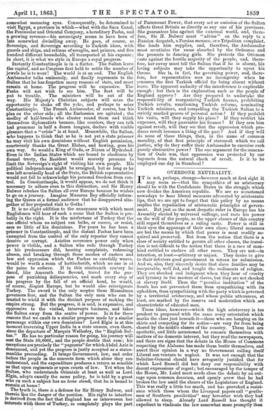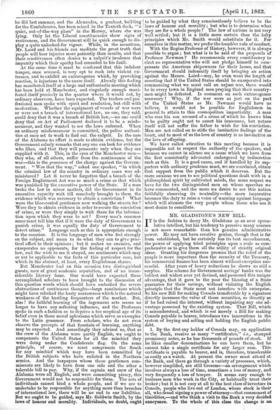OVERDONE NEUTRALITY.
IT is not, perhaps, strange—however much at first sight it may seem so—that the sympathies of an aristocracy should be with the Confederate States in the struggle which now divides the American republic. We are so accustomed nowadays to hear liberal measures advocated by aristocratic lips, that we are apt to forget that this policy by no means implies the repudiation of aristocratic principles of govern- ment. But just as the most despotic ruler in Europe has his Assembly elected by universal suffrage, and rests his power on the will of the people, so the upper classes of this country still regard themselves as a ruling caste. Power is still in their eyes the appanage of their own class ; liberal measures are but the means by which that power is most readily ac- quired and preserved. But from the notion that there is a class of society entitled to govern all other classes, the transi- tion is not difficult to the notion that there is a race of man- kind entitled to enslave all other races. They are not—in intention, at least—arbitrary or unjust. They desire to give to their inferiors good government in return for submission. And so, also, they sincerely desire that slave families may be inseparable, well fed, and taught the rudiments of religion. They are shocked and indignant when they hear of cruelty and tyranny in the masters of slaves, but they are not shocked at slavery itself. Thus the "peculiar institution" of the South has not prevented them from sympathizing 'with its upholders, from sympathizing with the party which is governed by a territorial aristocracy, and whose public utterances, at least, are marked by the reserve and moderation which are characteristic of educated men.
These ideas, however—which the high aristocracy is too prudent to propound with the same noisy ostentation which marks the class just beneath it—those who are hanging on its skirts and competing for its notice—are very far from being shared by the middle classes of the country. These last are apathetic, and little accustomed to concern themselves with matters of no domestic interest, but they read the newspapers, and there are signs that the debate in the House of Commons respecting the Alabama has made them bestir themselves, and assert their opinion in a way no Government calling itself Liberal can venture to neglect. It was not enough that the Solicitor-General should have arrogantly justified that for which Lord Russell did but deny our responsibility with decent expressions of regret ; but encouraged by the temper of the House, Mr. Laird must needs close the debate by an out- rage upon common decorum, and openly avow that he had broken the law amid the cheers of the Legislature of England. This was really a little too much, and has provoked a resist- ance which those whom the Liverpool papers call "gentle- men of Southern proclivities" may hereafter wish they had allowed to sleep. Already Lord Russell has thought it expedient to vindicate the law somewhat more promptly than he did last summer, and the Alexandra, a gunboat, building for the Confederates, has been seized in the Toxteth dock, "a quiet, out-of-the-way place" in the Mersey, where she was lying. Only let the Liberal constituencies show signs of restiveness, and the Government will be quick enough to dis- play a quite unlooked-for vigour. While, in the meantime, Mr. Laird and his friends can meditate the great truth that people will bear injuries more patiently than insults, and that their sensitiveness often denies to a culprit's insolence that impunity which their apathy had conceded to his fault.
At the same time it must be confessed that this indolent temper, once aroused, is very apt to rush into violent ex- tremes, and to exhibit an extravagance which, by provoking reaction, is injurious to the cause itself. Already this feeling has manifested itself at a large and enthusiastic meeting which has been held at Manchester, and singularly enough mani- fested itself precisely in the quarter where it would not, by ordinary observers, have been expected. The traders and pro- fessional men spoke with spirit and resolution, but still with moderation. Whether the equipment of vessels of war were or were not a breach of international law, no one, they said, could deny that it was a breach of British law,—no one could deny that an Act of Parliament declared it to be a misde- meanour, and they wanted to see the laws enforced. When an ordinary misdemeanour is committed, the police authori- ties at once set to work to find out the culprit. In the case of the Alabama no effort is made to obtain evidence, but the Government calmly remarks that any one can look for evidence who likes, and that they will prosecute only when they are supplied with it. This, in the eyes of the Manchester men— they who, of all others, suffer from the continuance of the war—this is the gravamen of the charge against the Govern- ment. "Was that the way," asked one speaker, "in which the criminal law of the country in ordinary cases was ad- ministered? Let it never be forgotten that a breach of the Foreign Englistment Act was as much a crime as that which was punished by the executive power of the State. If a man broke the law in minor matters, did the Government in its executive capacity wait till somebody brought to them the evidence which was necessary to obtain a conviction ? What were the blue-coated gentlemen now walking the streets fir? Were they to obtain evidence in order to secure the conviction of crime, or were they simply to wait there for the informa- tion upon which they were to act ? Every man's common sense must tell him that if it were the duty of Government to punish crime, it was equally the duty of Government to detect crime." Language such as this is appropriate enough to the occasion. It is the language of men who feel strongly on the subject, and mean to do what they can to give prac- tical effect to their opinions ; but it makes no enemies, and exasperates no opponents, for the feeling of respect for the law, and the wish to see it obeyed, are sentiments which may or not be applicable to the facts of this particular case, but which in the abstract, at least, every Englishman shares.
But Manchester had on this occasion two distinguished guests, men of great academic reputation, and of no incon- siderable literary fame. One would have expected these accomplished scholars to have brought to the discussion of this question words which should have embodied the severe abstractions of continuous thought—large conclusions which might have rebuked the hasty narrowness which is the natural weakness of the bustling frequenters of the market. But, alas ! the faithful learning of the ingenuous arts seems no longer to have any softening influence, and the Professors spoke in such a fashion as to deprive a too sceptical age of its belief even in those moral aphorisms which serve as examples to the Latin grammar. From scholars, who do not even observe the precepts of that fountain of learning, anything may be expected. And accordingly they advised us, that as the crew of the Alabama were partly English, we ought to compensate the United States for all the mischief they were . doing under the Confederate flag. On the same principle, of course, we must compensate the South for any mischief which may have been committed by the British subjects who have enlisted in the Northern armies. And the taxpayers whom these gentlemen com- miserate are likely to have from one side and the other a tolerable bill to pay. Why, if the captain and crew of the Alabama were all English, and were committing piracy, this Government would not be responsible for them. The acts of individuals cannot bind a whole people, and if we are to undertake to be responsible for anything more than breaches of international law, there will be no end to our liabilities. But we ought to be guided, says Mr. Goldwin Smith, by the laws of honour and morality. Individuals, no doubt, ought
to be guided by what they conscientiously believe to be the laws of honour and morality; but who is to determine what they are for a whole people ? The law of nations is not very well settled; but it is a little more certain than the lofty principles which Mr. Smith would substitute for it. For ourselves in this matter, we prefer the humbler rule of conduct.
With the Regius Professor of History, however, it is always possible to argue ; but what is to be said of the proposals of Professor Newman ? He recommends every constituency to elect no representative who will not pledge himself to com- pensate the American shipowners for their losses, and that Government should indemnify itself by bringing an action against the Messrs. Laird—nay, he even went the length of asserting that if the United States should be exasperated into commenchr,b what we must call an unjust war, there would be in every town in England men praying that their country- men might be defeated. Is comment on such extravagance necessary ? Why, if the war were as just on the part- of the United States as Mr. Newman would have us. believe, it would not be possible for Englishmen in general to attain to this cosmopolitan impartiality. A man who sees his son accused of a crime of which he knows him to be guilty ought not to assert his innocence, but nature- itself will not suffer the father to wish for his conviction. Men are not called on to stifle the instinctive feelings of the heart, and to most of us the love of country is as instinctive rm the love of offspring.
We have called attention to this meeting because it is impossible not to respect the authority of the speakers' and because we cannot in silence see a cause which we have from " the first consistently advocated endangered by indiscretion such as this. It is a good cause, and if handled by its sup- porters with ordinary prudence must, we are convinced, obtain that support from the public which it deserves. But the- more anxious we are to see political questions dealt with in a philosophical spirit by cultivated minds, the more respect we have for the two distinguished men on whose speeches we- have commented, and the more we desire to see this nation faithfully observing its neutrality—the more imperative becomes the duty to raise a voice of warning against language which will alienate the very people whom those who use it most desire to conciliate.































 Previous page
Previous page